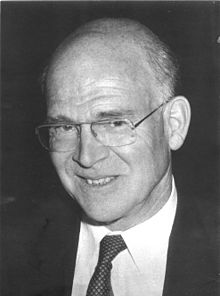Kurt Wiemers
Kurt Wiemers (born June 6, 1920 in Cologne ; † February 14, 2006 in Denzlingen near Freiburg ) was a German anesthetist , university professor and researcher .
Life
Kurt Wiemers was the only child of the doctor Albert Wiemers and his wife Aenne, née Koll. After attending the humanistic high school Kreuzgasse in Cologne, he studied medicine in Freiburg , Berlin , Königsberg , Innsbruck and Munich after graduating from high school in 1938 . He began his clinical career with unpaid positions: in 1946 at the Caritas Hospital Cologne-Hohenlind and in 1947 at the Physiological Institute of the University of Cologne . In 1951 he became a scientific assistant at the surgery department at Cologne University Hospital. Because of his physiological knowledge, he was temporarily seconded to the Medical Academy in Düsseldorf to learn about the new developments in anesthesia for Germany at the time . There he recognized the importance of modern methods, for example relaxation , intubation and ventilation , for the progress of surgery and then devoted himself to the new field. He worked with the surgeon and, like Wiemer's physiologically trained Ernst Kern , and published several medical papers with him. In 1953 the surgeon Hermann Krauss called him to Freiburg to set up an anesthesia department at the surgical university clinic there.
Kurt Wiemers became a specialist in anesthesiology in 1955, a specialist in surgery in 1959 and qualified as a professor in 1957 in anesthesiology. In 1961, while visiting professor at Harvard Medical School in Boston, he acquired connection to international progress in anesthesiology. In 1963 he was appointed adjunct professor in Freiburg and in 1966 he was appointed to a new chair for anesthesiology. At the same time he became director of the Institute for Anesthesiology, which, as an independent clinical facility, gradually looked after all operative university clinics in Freiburg and its own intensive care unit. In 1975 a department for experimental anesthesiology was set up on his initiative. He was also heavily involved in planning the extension of the surgery at the university hospital.
His influence created a trusting working atmosphere in his rapidly growing department. His co-workers called him "Boss", and he was addressed that way by older colleagues who were close to him.
In 1985 Wiemers retired .
Services
In teaching and research, Kurt Wiemers was a pioneer for the new subject of anesthesiology in Germany. He was appointed a full member of the European Academy of Anesthesiology . He was one of the founding members of the German Society for Anesthesiology and Intensive Care Medicine , of which he was president from 1963 to 1964. He also represented the interests of the university anesthetists in the presidium of the professional association of German anesthetists . In recognition of his services, Wiemers was awarded the Badge of Honor of the German Society for Anesthesiology and Intensive Care Medicine in 1990. In 1995 he was made an honorary member of the Society.
Publications (selection)
Numerous book chapters and more than 130 publications are the result of his scientific work:
- Medicinal influence on the survival time of the brain in the event of a circulatory interruption. Thoracic Surgery 6, 145-147 (1958)
- The dosage of liquid inhalation anesthetics. The anesthetist 13, 171–172 (1964)
- Problems and definition of clinical death. The internist 10, 181-184 (1969)
- Postoperative early complications. Basics of patient treatment on the guard ward. Thieme, 1994. ISBN 3-13-420202-6
- Keep breathing - live! ecomed, Landsberg 1999. ISBN 3-609-51730-1 (autobiography).
- Literature by and about Kurt Wiemers in the catalog of the German National Library
Web links
- J. Radke: Obituary for Prof. Dr. med. Kurt Wiemers
Individual evidence
- ↑ Ernst Kern: Seeing - Thinking - Acting of a surgeon in the 20th century. ecomed, Landsberg am Lech 2000. ISBN 3-609-20149-5 , pp. 308-310 and 312.
| personal data | |
|---|---|
| SURNAME | Wiemers, Kurt |
| BRIEF DESCRIPTION | German anesthetist |
| DATE OF BIRTH | June 6, 1920 |
| PLACE OF BIRTH | Cologne |
| DATE OF DEATH | February 14, 2006 |
| Place of death | Denzlingen |
